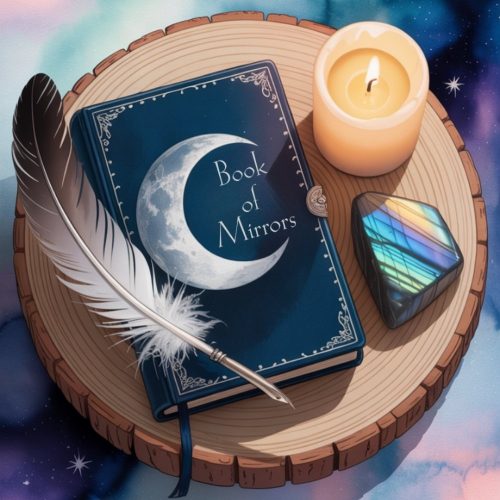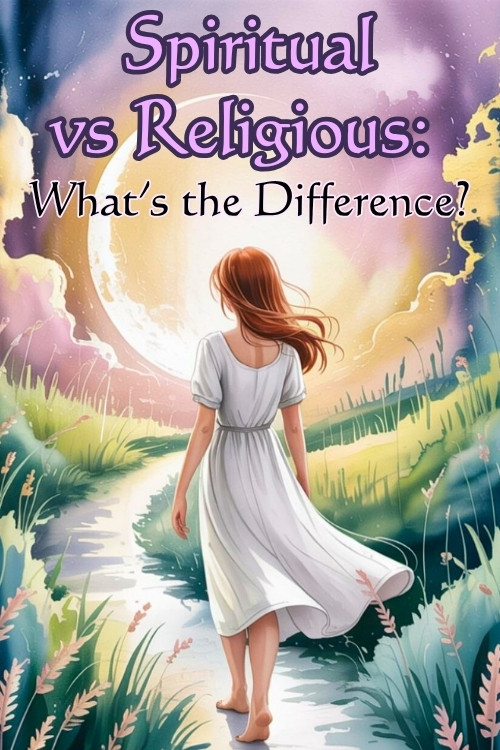If you’ve ever found yourself saying “I’m spiritual but not religious” and wondering what that really means, you’re not alone. Many of us feel called to the divine, but not always through the path of organised religion.
Maybe you looked up at the moon and felt something stir. Like something ancient, sacred, and beautiful beyond words was happening?
That quiet knowing, that sense of something more. That’s often where the spiritual journey begins.
Whether you believe in the Universe, goddesses, spirits, or simply the sacredness of nature, there’s space for you here.
In this post, I’ll share what spirituality means to me, how it differs from religion, and how you might begin to explore a spiritual mindset that feels both free and full of meaning.
What Is the Difference Between Spirituality and Religion?
Religion tends to follow shared structures: places of worship, sacred texts, rituals, and clear lines of belief. For many, this offers a deep sense of belonging and tradition. Religion provides a road map, a history, and a community.
Spirituality, by contrast, feels like a path that’s forming as you walk it. It’s more personal than organised, more intuitive than rule-bound. It doesn’t require a group or a label. Just a willingness to listen, to feel, and to trust.
I’ve always felt more at home in quiet, moonlit spaces than in rows of pews. For me, spirituality is a conversation between my soul and the Universe. Something that’s in constant gentle motion, rather than a strict set of beliefs.
So what does spirituality mean to me?
I believe in many divine beings, goddesses, gods, and spirits, but not as separate entities. They feel like radiant threads within one great tapestry. And the canvas they’re woven into is the Universe. A vast, loving, all-encompassing presence that exists in everything and everyone.
The gods and goddesses I honour aren’t separate from the divine whole. They’re faces of it. Focused lenses that help me understand specific energies.
One might guide me through healing, another through courage, another through grief. They allow me to connect more deeply, especially when the broadness of the universal divine feels too big for my human mind to hold all at once.
And this is what spirituality gives me:
– A sense of layered connection.
– A freedom to feel, rather than follow.
– A belief in meanings and messages from the beyond.
What Does It Mean to Be Spiritual but Not Religious?
When someone says, “I’m spiritual but not religious,” it doesn’t mean they’ve abandoned faith. It means they’ve redefined it. It often means they:
- Feel a connection to something greater than themselves.
- Experience the divine in nature, dreams, energy, or inner knowing.
- Don’t follow a single religion, but still hold reverence for sacredness.
- Seek personal growth, healing, and connection beyond the material world.
If you feel drawn to rituals but not rules, to energy but not doctrine, to intuition but not dogma, you might already be on a spiritual path.
How to Be Spiritual Without Religion
If you’re starting to walk this path, you don’t need a rulebook, but a few gentle guideposts can help you find your rhythm.
Begin by noticing what already feels sacred to you. Maybe it’s the moon, the wind, the stars. Maybe it’s the way you feel after a walk in the woods or the quiet magic of a candlelit bath.
Let those moments be your teachers.
Remember spirituality is a relationship, not a rulebook. There’s no need to get it right. All you have to do is show up, open-hearted, and curious.
Here are a few ways to deepen your connection:
- Try a simple new moon ritual with intention-setting.
- Create a small altar with objects that feel meaningful.
- Read stories about goddesses or mythological spirits that call to you.
- Journal about signs or symbols you’ve experienced.
These are invitations, not requirements. Your soul will know what feels right to you.
🔗You might find Why Journaling Is a Powerful Spiritual Tool helpful (Coming soon)
Can You Believe in God If You’re Spiritual?
Yes.
But your version of “God” might not look like the one you grew up with.
Some spiritual people connect with a singular god, such as the Christian God. Others, like me, see divinity as multifaceted, expressed in goddesses, gods, spirit guides, ancestors, and the natural world. Some people speak to the Universe. Others find comfort in angels or in the presence of animal messengers.
What matters is that you feel that connection.
Spirituality gives you the freedom to experience divinity in a way that feels personal, meaningful, and alive.
Embracing Your Own Sacred Path
To me, being spiritual means walking through life with soft eyes and an open heart.
It means listening to whispers, following symbols, and remembering that the divine lives in everything, from the rustle of leaves to the spark of intuition. It doesn’t need to be defined. It just needs to be felt.
Whether you find that feeling through meditation, moon rituals, or a mindful breath, your path is valid.
You don’t need to be religious to feel the presence of something sacred. You just need to be open. The sacred meeting you anywhere.
🌕 Browse my Etsy shop for printable moon journals and spirit-inspired writing pages.
✨ Pin this post to revisit when your soul needs a reminder.




